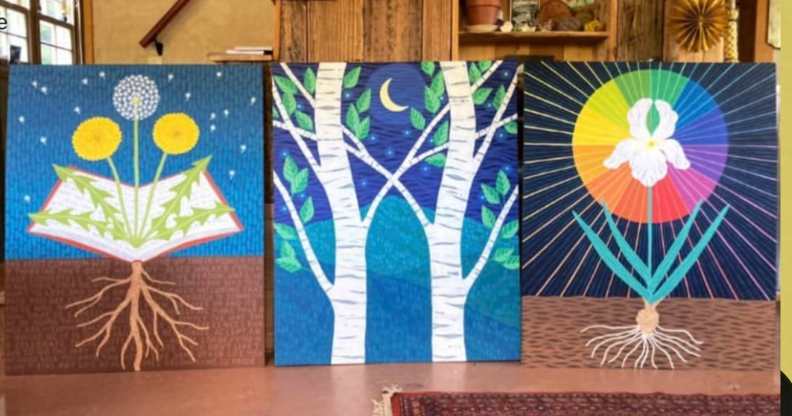US town considers banning all public art because some of it might be gay

A US town is considering a ban on public art because some of it might have gay undertones. (NOCO Mural Project)
A town in the US is genuinely considering a ban on all public art because some of the art might be gay or promote LGBTQ+ ideals.
Littleton, New Hampshire is a politically purple town – equal parts liberal and conservative.
In the 2020 Presidential Election, Donald Trump and Joe Biden won almost the exact same number of votes.
However, as so-called culture wars escalate across the US, tensions are starting to rise in the bipartisan town.
It all started when a local councilor complained at a town meeting about a three-piece public mural that had been funded by a number of local organisations including a Pride group.
The mural, which was described in a local newspaper as a “diversity mural”, featured flowers, trees, a rainbow colour wheel, and a reference to defying book bans.
The titles of each piece were: “We will not be Banned”, “We are Joy”, and “We Belong.”
Complaints about the artwork from members of the conservative-leaning three-person town council have forced town manager Jim Gleason to consider restricting certain works of art in public spaces.
Although it has not been confirmed what exactly the grounds would be for wanting to restrict certain public works of art, discussions heavily focused on art with LGBTQ+ themes, CBC News reports.
After investigating their legal options, Gleason determined that it would be difficult to ban particular types of artwork from public spaces – after all, exclusively restricting LGBTQ+ artwork could breach constitutional law.
That leaves the town with few options. One that is genuinely being considered is to ban all public art.
On the potential of a full-blown public art ban, town manager Gleason said: “Their [the town council’s] decision is, ‘All right, does it bother you enough that you want to ban, then, all art?'”
“Or is it like, ‘OK, it bothers me, but I don’t want to get into a constitutional legal fight and spend taxpayers’ dollars and go through on this?’ That’s the decision they will have to make.”
One of the town council members who takes issue with murals like this is Carrie Gendreau, who is also a Republican state senator for New Hampshire.
Gendreau first expressed her dislike of the mural back in August, stating that “what went up was not good… I don’t want that to be in our town.”
Gendreau, who has told the Boston Globe that “homosexuality is an abomination” and she is “very concerned” about the “demonic hidden messages” that are “creeping into [the] community” through public art, has faced heavy backlash from the people of Littleton.
In September, hundreds of residents attended a town meeting to shut down Gendreau’s comments.
A statement from North Country Pride shared that a more recent town board meeting saw multiple calls for Gendreau to resign and for the abolishment of the town’s spending of taxpayer money on a possible art ban.
Local organisations remain concerned that their town could place a ban on public art as a whole.
One resident, Jordan Applewhite, who owns a bar and restaurant in Littleton told the Boston Globe: “We have a town government that is actively hostile to LGBTQ people, even if they’re pillars of the community, even if they’re helping with tourism, and helping with the vibrancy of our local arts and culture scene, and even if they’re bringing a lot of money.
“That doesn’t feel like responsible government.”
Although Gleason acknowledges that the town councilmembers’ issues with public art are “really much deeper in reference to views about society and the LGBTQ community,” to meet their demands would mean banning artwork altogether.
“You can’t just restrict art that you don’t like,” he said.
How did this story make you feel?

